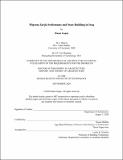Migrant sarifa settlements and state-Building in Iraq
Author(s)
Gupta, Huma.
Download1288576270-MIT.pdf (50.73Mb)
Other Contributors
Massachusetts Institute of Technology. Department of Architecture.
Advisor
Nasser Rabbat.
Terms of use
Metadata
Show full item recordAbstract
This dissertation examines the negative dialectical relationship between state-building and sarifa (reed) and kukh (mud) dwellings built by rural migrants in Baghdad. Rural migrants served as the paradigmatic developmental subjects of the Iraqi state, providing a supply of devalued labor for the army, civil service, construction industry, domestic services, manufacturing, police, and transportation. In contrast with how Baghdad's history has been portrayed, sarifa and kukh dwellings were arguably the most salient architectural feature of the mid-20th century capital. These dwellings are thus, examined beyond discourses of underdevelopment or the vernacular in order to show how the Iraqi governmental apparatus was shaped and reshaped through encounters with migrant subjects and their settlements between 1920 and 1970. Rural migrants in the capital were central to communist agitation, protest movements, demands for land and housing, and the 1958 anti-monarchic revolution that transformed the modern state of Iraq. By examining how governmental apparatuses were designed to manage land dispossession under the benevolent guise of urban development, this dissertation narrates how the birthing of state territory is a violent and iterative process. Birthing here is used in the gerund form to indicate that this process is never fully realized. It exists in a state of becoming, between dwelling and building. This dissertation recuperates the figure of the sarifa-dweller as a central subject in Iraq's historiography. And it employs rare archival film footage, photographs, architectural drawings, diplomatic records, government reports, interviews and surveys in order to reconstruct the history of these ephemeral places through the very documentation strategies, which accompanied modes of state formalization that sought to erase them. Migrant settlements were exceptional places where macroeconomic theory or architectural modernity were allowed to disintegrate until the point that they became an economic or political problem for the ruling regime. Lastly, this dissertation examines how the international macroeconomic project of devaluing rural architecture was applied towards sarifa dwellings in Iraq. It demonstrates that the material transformation of dwelling in Iraq was, therefore, part of a larger globalist project of integrating individuals whose lives and dwellings were rendered unproductive through the calculative frameworks of a world industrial system.
Description
Thesis: Ph. D. in History and Theory of Architecture, Massachusetts Institute of Technology, Department of Architecture, September, 2020 Cataloged from the official pdf of thesis. Includes bibliographical references (pages 317-331).
Date issued
2020Department
Massachusetts Institute of Technology. Department of ArchitecturePublisher
Massachusetts Institute of Technology
Keywords
Architecture.